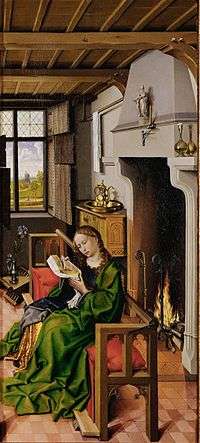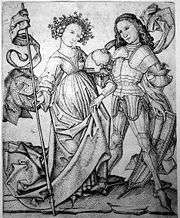The Testament of Cresseid


The Testament of Cresseid is a narrative poem of 616 lines in Middle Scots, written by the 15th-century Scottish makar Robert Henryson. It is his best known poem.[1] It imagines a tragic fate for Cressida in the medieval story of Troilus and Criseyde which was left untold in Geoffrey Chaucer's version. Diomedes, an Achaean hero with whom Cressied begins a romantic relationship after being separated from and subsequently losing romantic interest in Troilus, banishes Cresseid from his company thereby leaving her destitute. After wandering for a while amongst the Greek soldiers, seeking their company, she returns to the home of her father Calchas, a keeper of the temple of Venus. Though Calchas welcomes her heartily, Cresseid desires to hide away from the world and encloses herself in a private oratory, where she weeps and rages against the cruelty of Venus and Cupid in, as she sees it, leading her on. The gods take offence at this blasphemy, and assemble to pass judgement on her, and the poem features graphically-realised portraits of the planetary pantheon of gods in the dream vision at its heart. They remove her youth and good looks, leaving her ill and ugly. Her symptoms being similar to those of leprosy, she is thus considered a social outcast, and decides she must join a leper colony. There she laments her fate until a fellow leper woman encourages her not to sigh over things which cannot be changed, but instead to take her cup and clapper and seek help from any kind passers-by. In time, however, cold and hunger wears her down and she is forced to beg for a living. One day, whilst she is begging, Troilus and the garrison of Troy pass by. Recognising Cresseid, Troilus is greatly moved, and he gives up a great deal of wealth to the lepers before riding off, almost fainting for grief when he reaches Troy. Upon finding out her benefactor's identity, Cresseid is also overcome with emotion and her health takes a turn for the worse. She berates herself for her treatment of him, before sitting down to write her will, dying soon after. However, despite Cresseid's ultimate disgrace and tragic end, Henryson is not without pity for her misfortune, as seen in the lines:
Yit nevertheless, quhat ever men deme or say
In scornefull langage of thy brukkilnes,
I sall excuse als far furth as I may
Thy womanheid, thy wisdome and fairnes,
The quhilk fortoun hes put to sic distres
As hir pleisit, and nathing throw the gilt
Of the, throw wickit langage to be spilt!
Henryson's cogent psychological drama makes the poem one of the great works of northern renaissance literature.
A modern English translation by Seamus Heaney, which also included seven of his fables from The Morall Fabillis, was published in 2009.
Characters
- Cresseid, daughter of Calchas, who is punished for breaking her vow of love to Troilus
- Troilus, one of the sons of Trojan king Priam, and former lover of Cresseid
- Calchas, Cresseid's loving father. In the Testament, he is a priest of Venus and Cupid.
- The gods Cupid, Saturn, Jupiter, Mars, Phoebus, Venus, Mercury, and Cynthia.
Structure
- Throughout the poem, Henryson makes use of the rhyme royal, a rhyme scheme introduced and popularised by Geoffrey Chaucer, and set out as follows- ABABBCC. The stanzas are generally seven lines each in length, and in iambic pentameter. However, in the section in which Cresseid laments her fate from the leper colony (a Complaint), the stanzas are nine lines in length, and with the rhyme scheme AABAABAAB
Notes
- ↑ Kindrick, Robert L. "The Testament of Cresseid: Introduction". TEAMS Texts. University of Rochester. Retrieved 12 May 2013.
References
Modern edition
- The Poems of Robert Henryson. Ed. Robert L. Kindrick. Kalamazoo, Michigan: Medieval Institute Publications, 1997. Electronic Access.
- The Testament of Cresseid and Seven Fables. Robert Henryson. Translated by Seamus Heaney. Bloomsbury House, London: Faber and Faber Ltd, 2009
Further reading
- Gray, Douglas. Robert Henryson. English Writers of the Late Middle Ages, no. 9. Brookfield, Vermont: Variorum, 1996.
- Kindrick, Robert L. "Monarchs and Monarchy in the Poetry of Henryson and Dunbar." In Actes du 2e Colloque de Langue et de Littérature Ecossaisses. Eds. Jean-Jacques Blanchot and Claude Graf. Strasbourg: Université de Strasbourg, 1979. pp. 307–25.
- McDiarmid, Matthew P. "Robert Henryson in his Poems." In Bards and Makars. Eds. Adam J. Aitken, Matthew P. McDiarmid, and Derick S. Thompson. Glasgow: University of Glasgow, 1977. pp. 27–40.
- Patterson, Lee W. "Christian and Pagan in The Testament of Cresseid." Philological Quarterly 52 (1973), 696-714.
- Ridley, Florence. "A Plea for Middle Scots." In The Learned and the Lewed. Ed. Larry D. Benson. Cambridge: Harvard University Press, 1974. pp. 175–96.
- Rowland, Beryl. "The 'seiknes incurabill' in Henryson's Testament of Cresseid." English Language Notes 1 (1964), 175-77.
- Spearing, A. C. "The Testament of Cresseid and the High Concise Style." In Criticism and Medieval Poetry. London: E. Arnold, 1964. pp. 118–44.
- Stephenson, William. "The Acrostic “Fictio” in Robert Henryson’s The Testament of Cresseid (Lines 58–63)," Chaucer Review, 92.2 (1994), 163–75.
- Utz, Richard. "Writing Alternative Worlds: Rituals of Authorship and Authority in Late Medieval Theological and Literary Discourse." In Creations: Medieval Rituals, the Arts, and the Concept of Creation. Eds. Nils Holger Petersen, et al. Turnhout: Brepols, 2007. pp. 121–38.
- Whiting, B. J. "A Probable Allusion to Henryson's 'Testament of Cresseid.' " Modern Language Review 40 (1945), 46-47.